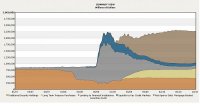Tilted
..
Fed Will Ease Monetary Policy on Aug. 10: Economist
Although what is being predicted here would be craziness, I fear the prediction is likely on target. Push that rope people - harder - it's not working fast enough, push harder! Apparently, free money isn't cheap enough.
Japan's Nomura has become the first investment bank to predict the Federal Reserve will begin to ease monetary policy following the recent slowdown in growth in the world's biggest economy.
The deterioration in expectations for growth and inflation argues for an easing of monetary policy, Paul Sheard, the global chief economist at Nomura, wrote in his latest report.
"We expect the Fed to at least stop the passive contraction of its balance sheet," he added.
Pushed by lawmakers last month, Fed Chairman Ben Bernanke outlined three ways the Federal Open Market Committee (FOMC) could further stimulate growth.
First, Bernanke indicated he could change the Fed's language to convince the market it will not allow deflation. Second, the FOMC could endorse a decision by the Board of Governors to lower the interest rate it pays on required and excess reserves.
And the final option would be for the FOMC to restart the asset purchase program that ended in March. For any of these actions to be taken, would have to become clear that the recovery was no longer sustainable, according to Bernanke.
Last week, Federal Reserve Bank of St. Louis President James Bullard told CNBC that the central bank needs a plan for more quantitative easing if the situation will require it.
Although what is being predicted here would be craziness, I fear the prediction is likely on target. Push that rope people - harder - it's not working fast enough, push harder! Apparently, free money isn't cheap enough.




